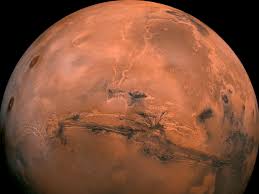Findings could prove good news for those hoping to explore Mars’ surface
Source: Independent
Salty pockets of water are probably commonly found on Mars – but would not serve as homes for alien life, scientists have found.
The new research modelled the Martian atmosphere in an attempt to understand whether those briney pockets have the right conditions to be haitable on Earth. But they found that the water would have to be very cold to be used for hydration – so cold that it is below the theoretical low temperature for life.
The cold and extremely dry nature of Mars means that even the tiniest bit of water on its surface would freeze or evaporate straight away. But if it had salt in it, then it would have a lower freezing temperature and evaporate more slowly than pure water, which has led to hope that alien life could use it for hydration and as a home.
The researchers modelled the atmosphere to understand whether that water could be useful to life as we know it on Earth. They found that such brines are probably common on its surface, with as much as 40 per cent of the planet able to host stable, salty water
But they found that for any water to persist it would still have to be far too cold for life to survive.
“Even extreme life on Earth has its limits, and we found that brine formation from some salts can lead to liquid water over 40% of the Martian surface but only seasonally, during 2% of the Martian year,” said Alejandro Soto, a senior research scientist at the Southwest Research Institute, and co-author of the study.
“This would preclude life as we know it.”
In one way, the findings represent good news for scientists hoping to explore the Martian surface. It suggests that it would be quite difficult for life on Earth to travel alongside any missions and disrupt natural ecosystems on Mars, since it would almost certainly be wiped out straight away.
“These new results reduce some of the risk of exploring the Red Planet while also contributing to future work on the potential for habitable conditions on Mars,” said Dr Soto.
The findings would also mean that those regions would not be able to be classified as “Special Regions” under planetary protection laws that aim to stop the contamination of other worlds.
Source: Independent

































Leave a Comment
You must be logged in to post a comment.